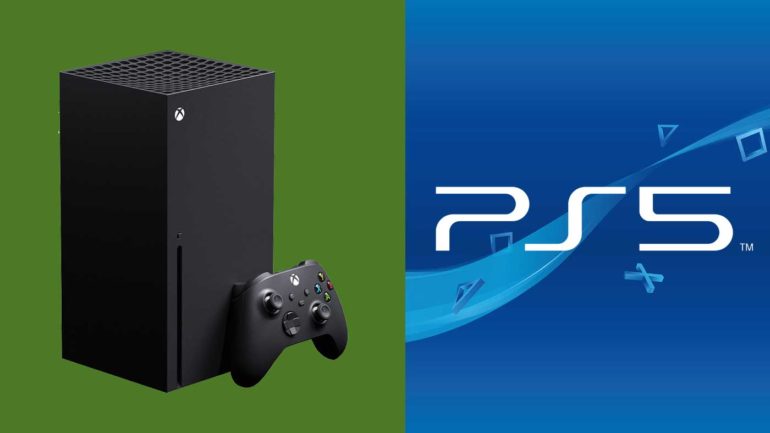We now know both of the specs of the PS5 and Xbox Series X and one thing is for sure. They are both absolute powerhouses. Interestingly enough, Sony and Microsoft have focused in on different areas, which we’ll go into a little bit of detail below. I’m not the most tech-minded person on the planet (when it gets to this kind of detail), but Digital Foundry has done great write-ups for both the PS5 and Xbox Series X).
CPU
Both the Xbox Series X and PS5 have a custom AMD Zen 2 CPU. There’s not a lot of differnece here but the consoles are utilising their CPUs differently. The Xbox Series X CPU is clocked at 3.8 GHz whilst the PS5 is clocked at 3.5 GHz.
GPU
An extremely similar story here, but the Xbox Series X definitely has a raw power advantage. Both the PS5 and Xbox Series X are using a custom AMD RDNA 2 (Radeon DNA) GPU. The PS5 has the power of computing 10.28 TFLOPs and 36 CUs whilst the Xbox Series X has the power of 12.16 TFLOPS and 52 CUs. It’s worth noting that Sony could be going for more IPCs which would explain the lower count in TFLOPs. Both GPUs are definitely significantly more powerful that what we have in the Xbox One and PS4, so this is a huge jump for both consoles.
This is likely to affect things like frame rate, but once again it does come down to how developers use both the CPU and GPU. For third party games, we’re likely to see better performance on the Xbox Series X, but with Sony first party known to take advantage of PlayStation hardware, we could see some pretty impressive performance on the PS5 as well.
SSD
Now this is where Sony is really putting all of their efforts into. Both consoles have a Custom SSD which is going to result in faster load times as well as a more seamless patching experience. The Xbox Series X has a 1TB NVME SSD with speeds of 2.4 GB/s (Raw) and 4.8 GB/s (Compressed). The PS5 has a 825gb Custom SSD with 5.5 GB/s (Raw) and somewhere between 8-9 GB/s (Compressed).
This won’t only help loading times, but developers have been saying that this is a game-changer for next-gen. Both consoles will help game worlds stream in faster, resulting in better quality graphics and draw distances for open worlds. With the PS5 SSD being nearly twice as fast, this could hugely impact how games are designed going forward.
EXTERNAL STORAGE
There’s also a fairly significant difference in how the PS5 and Xbox Series X are handling external storage. Both consoles will support a regular external HDD but only for PS4 and Xbox One backwards compatibility.
In terms of expandable storage (for use with Xbox Series X and PS5 games), the Xbox Series X will use a proprietary NVME 1TB SSD that is specced the same as the internal SSD. The PS5 will have a NVME SSD slot where you’ll be able to purchase off the shelf alternatives, but only ones that Sony recommend. These don’t currently exist on the market as the PS5 SSD is faster than anything available to PC owners.
MEMORY
Both consoles contain 16GB of GDDR6 ram, so it’s fairly similar in that regard. There’s some difference in how the ram is allocated on both consoles (the Xbox Series X splits the ram), but that shouldn’t matter too much in the long run.
BACKWARDS COMPATBILITY
This is another major difference. The Xbox Series X will be backwards compatible with every single Xbox One game as well as every Xbox 360/Xbox game that is currently backwards compatible on Xbox One X.
The PS5 backwards compatibility is a little bit murkier. Sony said that they’ve tested the top 100 PS4 games and are having great success with backwards compatibility for PS5. It’s unclear at this point whether that means that only these top 100 games will available at launch for backwards compatibility, or that’s just what they’re guaranteeing will work. Regardless, it doesn’t sound anywhere near as straight forward as what the Xbox Series X is promising.
PS5 AND XBOX SERIES X SPECS COMPARED
| PlayStation 5 | Xbox Series X | |
|---|---|---|
| CPU | 8x Zen 2 Cores at 3.5GHz | 8x Zen 2 Cores at 3.8GHz |
| GPU | 10.28 TFLOPs, 36 CUs at 2.23GHz (variable frequency) |
12.16 TFLOPs, 52 CUs at 1.825GHz |
| GPU Architecture | Custom RDNA 2 w/ hardware RT support |
Custom RDNA 2 w/ hardware RT support |
| Memory | 16GB GDDR6 | 16GB GDDR6 |
| Memory Bandwidth | 448GB/s | 10GB at 560GB/s, 6GB at 336GB/s |
| Internal Storage | Custom 825GB NVMe SSD | 1TB Custom NVMe SSD |
| IO Throughput | 5.5GB/s (Raw), 8-9GB/s (Compressed) |
2.4GB/s (Raw), 4.8GB/s (Compressed) |
| Expandable Storage | NVMe SSD Slot | 1TB Expansion Card |
| External Storage | USB HDD Support | USB HDD Support |
| Optical Drive | 4K UHD Blu-ray Drive | 4K UHD Blu-ray Drive |
| HDMI | 2.1 (4K/120Hz, 8K, VRR) | 2.1 (4K/120Hz, 8K, VRR |



